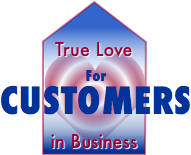 True love for customers reveals how nonprofit, commercial and government organizations of all sizes can create much stronger relationships and business by transforming how they relate to customers. True love for customers reveals how nonprofit, commercial and government organizations of all sizes can create much stronger relationships and business by transforming how they relate to customers.
Philosophers, clergy and psychologists have long acknowledged love as the most powerful force between humans. Love connects people like nothing else can, I think because love touches and binds together so many parts of the brain simultaneously: Love stimulates the reptilian brain because it’s related to survival. It is central to the limbic brain, which is grounded in emotion and memory. And love throughly engages the neocortex in art, ideals, and many other forms.
[…]
 In Healing Business, I’ll share why I think business needs healing and how CSRA is doing it with experiential social media. Business is wounded from a human point of view because it’s become very impersonal; large organizations don’t mean to, but they treat employees and customers as numbers because they don’t know or trust them. Experiential is a practical way to change that. In Healing Business, I’ll share why I think business needs healing and how CSRA is doing it with experiential social media. Business is wounded from a human point of view because it’s become very impersonal; large organizations don’t mean to, but they treat employees and customers as numbers because they don’t know or trust them. Experiential is a practical way to change that.
If you’d like to watch this post instead of reading it, click the thumbnail button!
[…]
 11 Celebration summarizes my reflections on CSRA’s first decade in business, and my vision for our next decade. We’ve been pioneering in experiential social media and social business transformation since I founded the firm in February 2006. 11 Celebration summarizes my reflections on CSRA’s first decade in business, and my vision for our next decade. We’ve been pioneering in experiential social media and social business transformation since I founded the firm in February 2006.
It’s difficult to encapsulate ten years of learnings, but that hasn’t stopped me from trying! This page will reprise some of my favorite posts, and it will feature a series of videos I’ve made in which I explain where we’ve been and where we’re going. This post will change frequently, so please consider it a work in progress.
[…]
 On human experience invites you to examine common marketing practices from a human experience perspective. It expands part of a presentation I gave at the University of Chicago Booth that the audience experienced as mind-bending based on their facial expressions. On human experience invites you to examine common marketing practices from a human experience perspective. It expands part of a presentation I gave at the University of Chicago Booth that the audience experienced as mind-bending based on their facial expressions.
Quite by accident I’ve happened on a rare view of humanity while practicing experiential social media during the last ten years. Experiential’s core research process involves conducting ethnographic research of thousands of people in specific situations. I analyze human behavior in communities in digital public, and it’s very rich, nuanced and complex. Ethnographic yields unparalleled qualitative and quantitative insights into behavior and human experience.
Experiential consistently reveals that many marketing practices repel people rather than attracting them because the environment in which marketing is practiced has completely changed from when these practices developed. Marketing creates mistrust and pushes people away, as I’ll show below. This post attempts to reveal this anachronism to you, so you can correct your practices and take the advantage from your competitors.
[…]
Social media strategy lessons learned summarizes eleven golden rules I’ve learned while leading strategy and its execution for global firms. Some of them might surprise you: I’ve come to learn that I have a different perspective on social media strategy since I advised global firms and startups in their corporate strategies before founding CSRA in 2006.
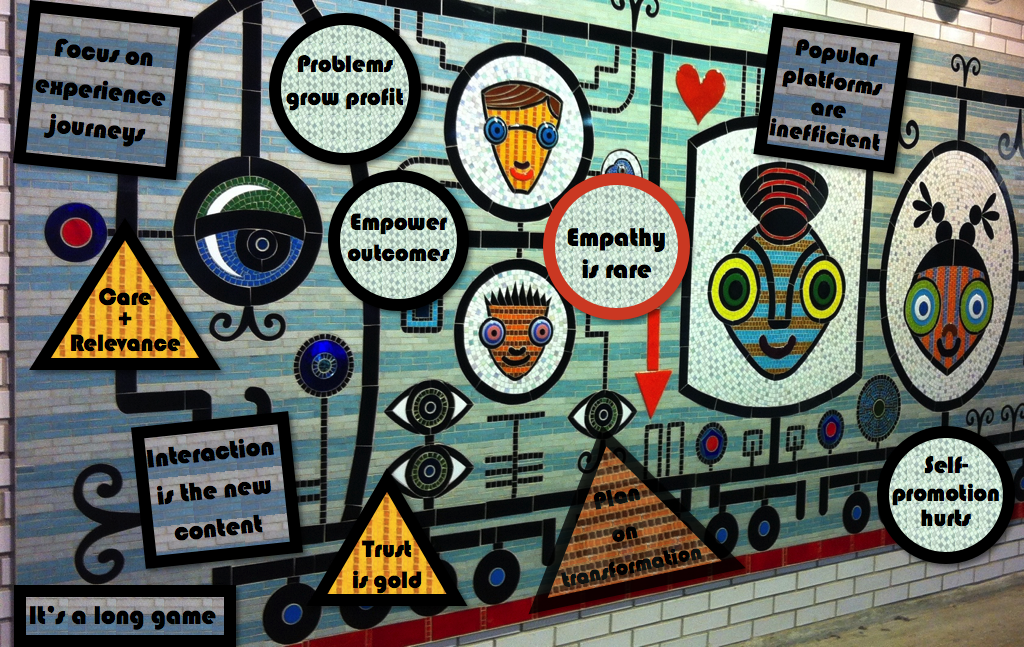
Before diving into lessons learned, let’s specify what we mean by social media strategy. “Strategy” itself is an overused work that denotes some mixture of research and planning. The strategy trade-off is simple: the more research and analysis you do upfront, the more risks you can foresee and account for in your plan. When you put your plan into action, you make fewer mistakes and execute more efficiently. Conversely, “minimum viable”/lean strategy does less research upfront, so the team learns while doing. Neither approach is universally “right,” and both work best for certain situations and firms.
[…]
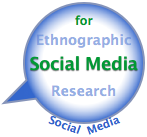 Ethnographic research for social media initiatives shows how ethnography can change the rules of social media programs in marketing, customer service, product development, recruiting and others. Ethnographic research enables teams to understand the people who are most important to your firm so they can relate to them at a completely different level. Moreover, interacting in digital public activates the network effect and the annuity effect, so it’s very scalable. Since your teams interact in digital public, where a far larger group of like people observes the interactions, they influence a large group of people and build relationships with them. People start trusting your firm, preferring your firm, and doing more business with you. See the Trust Business Chain Reaction and infographic for how it monetizes. Ethnographic research for social media initiatives shows how ethnography can change the rules of social media programs in marketing, customer service, product development, recruiting and others. Ethnographic research enables teams to understand the people who are most important to your firm so they can relate to them at a completely different level. Moreover, interacting in digital public activates the network effect and the annuity effect, so it’s very scalable. Since your teams interact in digital public, where a far larger group of like people observes the interactions, they influence a large group of people and build relationships with them. People start trusting your firm, preferring your firm, and doing more business with you. See the Trust Business Chain Reaction and infographic for how it monetizes.
Ethnographic research for social media initiatives is a game-changer for customer experience and digital transformation programs in multiple phases. It’s faster, less costly, and scalable. It provides an unprecedented combination of qualitative and quantitative research.
[…]
 The connected car and customer experience reveals a new opportunity for carmakers to dial into real customer behavior and desires around connected cars and autonomous cars. The Connected car and the autonomous car are powerful services that will help transform how people move around, and they are emerging during an era of unprecedented volatility in markets. I’ll wager that there’s never been a better or more challenging time to be a carmaker because opportunities and threats have never been higher. I’ve been fortunate to meet product managers and engineers who are pioneering connected and autonomous car services. I’ve also been meeting leaders in the Internet of Things (smart devices), of which the connected car is a part. The connected car and customer experience reveals a new opportunity for carmakers to dial into real customer behavior and desires around connected cars and autonomous cars. The Connected car and the autonomous car are powerful services that will help transform how people move around, and they are emerging during an era of unprecedented volatility in markets. I’ll wager that there’s never been a better or more challenging time to be a carmaker because opportunities and threats have never been higher. I’ve been fortunate to meet product managers and engineers who are pioneering connected and autonomous car services. I’ve also been meeting leaders in the Internet of Things (smart devices), of which the connected car is a part.
My crystal ball says that the connected car is a bet-the-brand proposition for carmakers because it directly addresses competing on customer experience, the most disruptive trend of all. As I detailed in The Social Channel, we have moved from a product/service-based economy toward an experience economy. Even IT analyst Gartner has proclaimed that customer experience is the final battleground for firms. […]
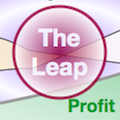 How Trusting Customers Drives Profit reveals how firms unwittingly broadcast that they don’t trust their customers, how that weakens profit, and how firms can take the leap. It’s a simple revolutionary idea that’s born from nine years of studying behavior while practicing experiential social media and social business. How Trusting Customers Drives Profit reveals how firms unwittingly broadcast that they don’t trust their customers, how that weakens profit, and how firms can take the leap. It’s a simple revolutionary idea that’s born from nine years of studying behavior while practicing experiential social media and social business.
Analysts, consultants and professors increasingly say that customer experience is the last bastion of competitiveness, and an increasing portion of total experience occurs in digital public. This presents firms with an unprecedented opportunity: interacting with people in digital public can create trust at scale and drive profit from revenue and cost levers.
[…]
How Free Things Are Disrupting Businesses + Radical Innovation + Guide to Free Business Models
Book Review: Free/Chris Anderson
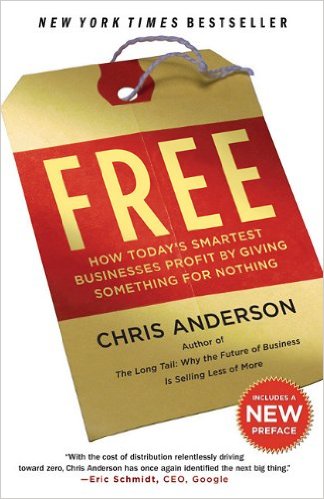 Free is an indispensable introduction to the disruption of “a product for a price,” one of the Industrial Economy’s key constructs. It is rich with examples of many of the pricing innovations and business models with which you’re probably familiar but haven’t thought about in depth. Many of its examples have to do with digital products, which are inherently disruptive because their distribution cost is close to zero, and they can displace legacy analog products. Free is an indispensable introduction to the disruption of “a product for a price,” one of the Industrial Economy’s key constructs. It is rich with examples of many of the pricing innovations and business models with which you’re probably familiar but haven’t thought about in depth. Many of its examples have to do with digital products, which are inherently disruptive because their distribution cost is close to zero, and they can displace legacy analog products.
Free is important and useful for two reasons beyond pricing and business model innovation: it contains a good dollop of behavioral economics with regard to pricing, and it gives numerous examples for thinking beyond the two-party market model that dominated the Industrial Economy, buyer and seller. As Anderson repeatedly shows, in digitally networked markets spawned by the Internet, firms put themselves at significant risk when they don’t adopt a networked ecosystem mindset. For example:
When something becomes free, […]
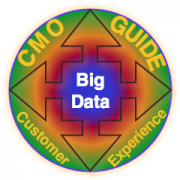 The CMO Guide to Big Data and Analytics shows how CMOs can use exploding digital social and transaction data from websites, enterprise systems, smartphones, tablets, cars, appliances, devices and the Internet of Things in surprising ways that have more to do with customer insight than technology. The CMO Guide to Big Data and Analytics shows how CMOs can use exploding digital social and transaction data from websites, enterprise systems, smartphones, tablets, cars, appliances, devices and the Internet of Things in surprising ways that have more to do with customer insight than technology.
The digital social world and modern cloud-based technologies have reinvented the practice of “analytics” so that it’s faster, cheaper and more open. I’ll paint a broad picture of this new world before referring you to other resources where you can drill down.
Big data is usually discussed from a big-ticket I.T. perspective, but new technology enables marketers to practice “lean data,” which starts small and proves/iterates hypotheses before scaling with large investments. The biggest barriers are knowledge and imagination, not technology.
Big data elevates opportunities for marketers because they can know their customers and serve them better based on their actions, not only what they say. Conversely, big data is increasing customers’ expectations for being treated as individuals, not “consumers.”
[…]
|
|
 True love for customers reveals how nonprofit, commercial and government organizations of all sizes can create much stronger relationships and business by transforming how they relate to customers.
True love for customers reveals how nonprofit, commercial and government organizations of all sizes can create much stronger relationships and business by transforming how they relate to customers.
 In Healing Business, I’ll share why I think business needs healing and how CSRA is doing it with experiential social media. Business is wounded from a human point of view because it’s become very impersonal; large organizations don’t mean to, but they treat employees and customers as numbers because they don’t know or trust them. Experiential is a practical way to change that.
In Healing Business, I’ll share why I think business needs healing and how CSRA is doing it with experiential social media. Business is wounded from a human point of view because it’s become very impersonal; large organizations don’t mean to, but they treat employees and customers as numbers because they don’t know or trust them. Experiential is a practical way to change that. 11 Celebration summarizes my reflections on CSRA’s first decade in business, and my vision for our next decade. We’ve been pioneering in experiential social media and social business transformation since I founded the firm in February 2006.
11 Celebration summarizes my reflections on CSRA’s first decade in business, and my vision for our next decade. We’ve been pioneering in experiential social media and social business transformation since I founded the firm in February 2006. On human experience invites you to examine common marketing practices from a human experience perspective. It expands part of a presentation I gave at the University of Chicago Booth that the audience experienced as mind-bending based on their facial expressions.
On human experience invites you to examine common marketing practices from a human experience perspective. It expands part of a presentation I gave at the University of Chicago Booth that the audience experienced as mind-bending based on their facial expressions.
 Ethnographic research for social media initiatives shows how ethnography can change the rules of social media programs in marketing, customer service, product development, recruiting and others. Ethnographic research enables teams to understand the people who are most important to your firm so they can relate to them at a completely different level. Moreover, interacting in digital public activates the network effect and the annuity effect, so it’s very scalable. Since your teams interact in digital public, where a far larger group of like people observes the interactions, they influence a large group of people and build relationships with them. People start trusting your firm, preferring your firm, and doing more business with you. See the Trust Business Chain Reaction and infographic for how it monetizes.
Ethnographic research for social media initiatives shows how ethnography can change the rules of social media programs in marketing, customer service, product development, recruiting and others. Ethnographic research enables teams to understand the people who are most important to your firm so they can relate to them at a completely different level. Moreover, interacting in digital public activates the network effect and the annuity effect, so it’s very scalable. Since your teams interact in digital public, where a far larger group of like people observes the interactions, they influence a large group of people and build relationships with them. People start trusting your firm, preferring your firm, and doing more business with you. See the Trust Business Chain Reaction and infographic for how it monetizes. The connected car and customer experience reveals a new opportunity for carmakers to dial into real customer behavior and desires around connected cars and autonomous cars. The Connected car and the autonomous car are powerful services that will help transform how people move around, and they are emerging during an era of unprecedented volatility in markets. I’ll wager that there’s never been a better or more challenging time to be a carmaker because opportunities and threats have never been higher. I’ve been fortunate to meet product managers and engineers who are pioneering connected and autonomous car services. I’ve also been meeting leaders in the Internet of Things (smart devices), of which the connected car is a part.
The connected car and customer experience reveals a new opportunity for carmakers to dial into real customer behavior and desires around connected cars and autonomous cars. The Connected car and the autonomous car are powerful services that will help transform how people move around, and they are emerging during an era of unprecedented volatility in markets. I’ll wager that there’s never been a better or more challenging time to be a carmaker because opportunities and threats have never been higher. I’ve been fortunate to meet product managers and engineers who are pioneering connected and autonomous car services. I’ve also been meeting leaders in the Internet of Things (smart devices), of which the connected car is a part. Free is an indispensable introduction to the disruption of “a product for a price,” one of the Industrial Economy’s key constructs. It is rich with examples of many of the pricing innovations and business models with which you’re probably familiar but haven’t thought about in depth. Many of its examples have to do with digital products, which are inherently disruptive because their distribution cost is close to zero, and they can displace legacy analog products.
Free is an indispensable introduction to the disruption of “a product for a price,” one of the Industrial Economy’s key constructs. It is rich with examples of many of the pricing innovations and business models with which you’re probably familiar but haven’t thought about in depth. Many of its examples have to do with digital products, which are inherently disruptive because their distribution cost is close to zero, and they can displace legacy analog products. The CMO Guide to Big Data and Analytics shows how CMOs can use exploding digital social and transaction data from websites, enterprise systems, smartphones, tablets, cars, appliances, devices and the Internet of Things in surprising ways that have more to do with customer insight than technology.
The CMO Guide to Big Data and Analytics shows how CMOs can use exploding digital social and transaction data from websites, enterprise systems, smartphones, tablets, cars, appliances, devices and the Internet of Things in surprising ways that have more to do with customer insight than technology.